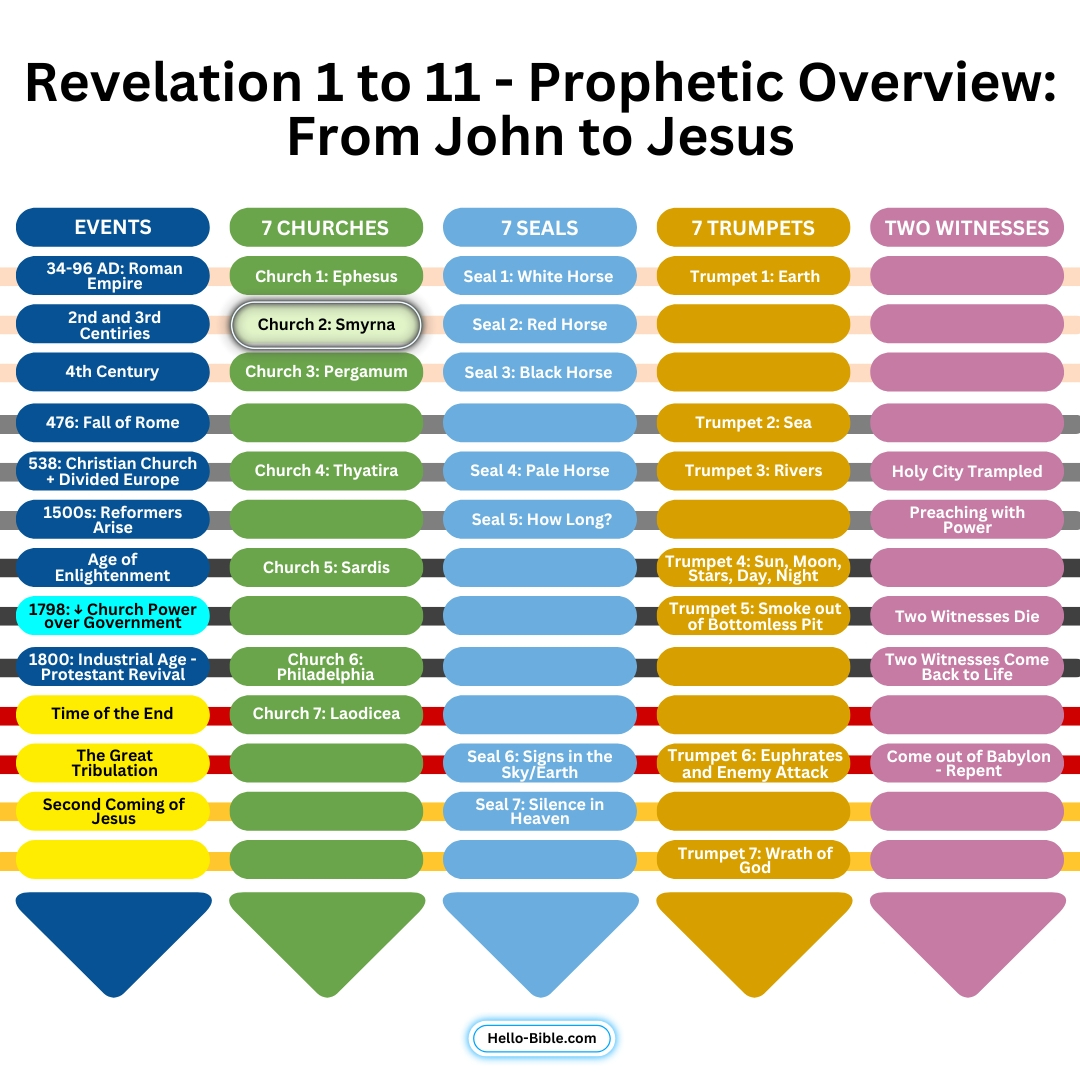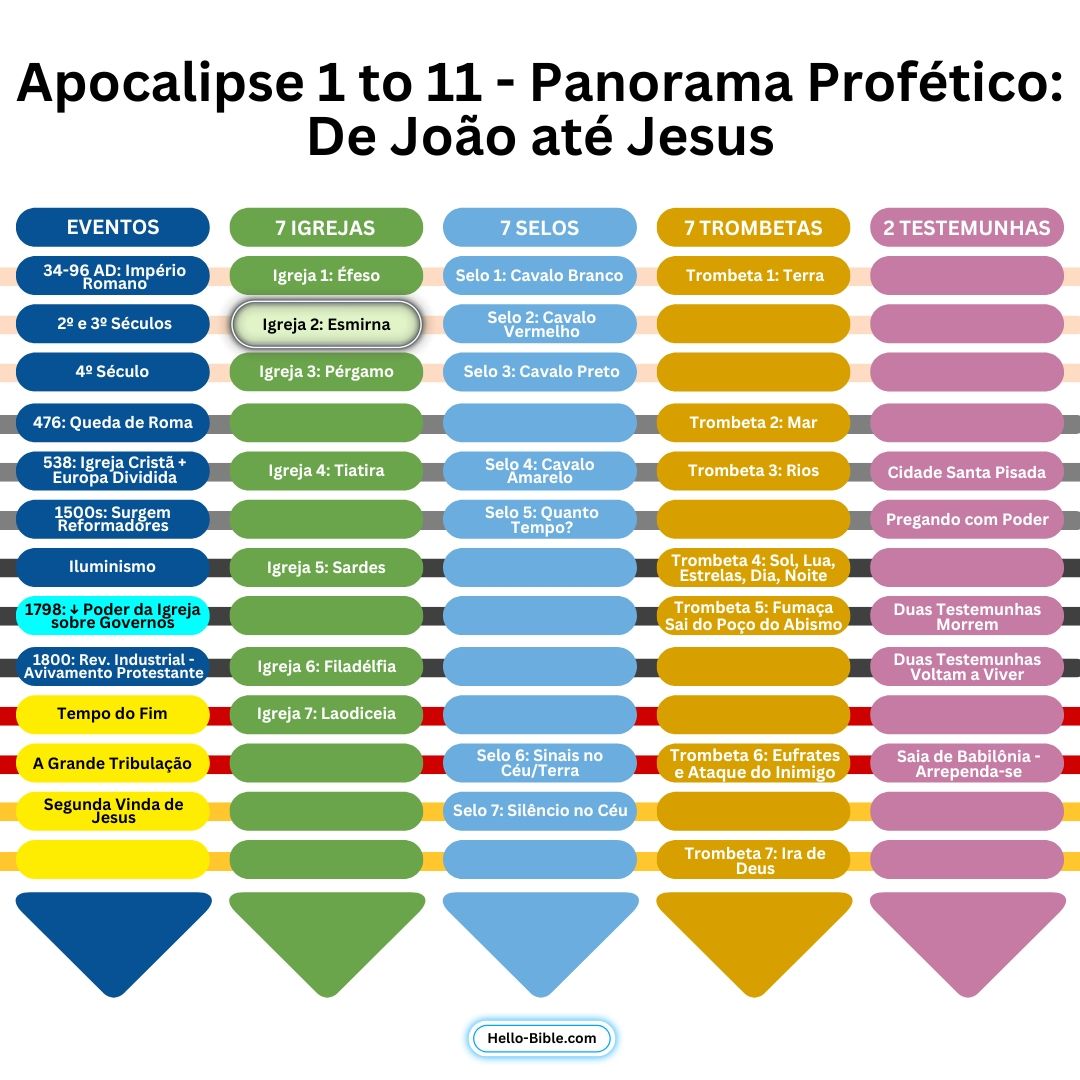8 And unto the angel of the church in Smyrna write; These things says the first and the last, who was dead, and is alive;
9 I know your works, and tribulation, and poverty, (but you are rich) and I know the blasphemy of them who say they are Jews, and are not, but are the synagogue of Satan.
10 Fear none of those things which you will suffer: behold, the devil shall cast some of you into prison, that you may be tried; and you shall have tribulation ten days: be faithful unto death, and I will give you a crown of life.
11 He that has an ear, let him hear what the Spirit says unto the churches; He that overcomes shall not be hurt of the second death.
Drawing Connections
In Part 1 of this study about the church in Smyrna, we saw how the church faced a stark contrast between its external circumstances and spiritual reality. Despite living in a free and wealthy city, the church experienced severe persecution and extreme poverty, yet remained spiritually rich. Jesus encouraged them not to fear the impending trials, assuring the overcomers that even in death, they would receive the crown of eternal life. He emphasized the call to remain faithful unto death.
Today we will conclude with Part 2, where we will go over the format of the letter to understand the finer details of the message and its prophetic application. If you haven't read Part 1 yet, please go back to study #15 to understand the context in which the Christians in the church of Smyrna received this letter.
Part 1 Part 2
PART 2
Closer Look
*** Recipient -> “To the Angel of the Church in Smyrna” ***: Once again, the letter is addressed to the leader of the church, but applicable to all the members. Please see the comments in study #9, #12, and #14.
*** Sender -> “The first and the last, who was dead, and is alive” ***: Jesus comes to the Church in Smyrna as one they can identify themselves with. All the things the Smyrnaeans are suffering, Jesus suffered as well. He was persecuted by pagan Romans, as well as Jews. He was persecuted to the point of death. His body was even prepared for burial with a mixture of myrrh, as per Jewish custom (John 19:39-40). But, the reason Smyrnaeans do not need to be afraid is because He resurrected, and is alive. This description of Jesus as the sender is exactly what John heard when he fell at Jesus’ feet in Revelation 1:17-18: “[…] Then he placed his right hand on me and said: Do not be afraid. I am the First and the Last. I am the Living One; I was dead, and now look, am alive for ever and ever! […]”. Please see study #10 for more details on this passage.
*** Assessment -> “I know…” ***: Jesus knows firsthand what the church is going through:
- Affliction: The sufferings the church in Smyrna was going through were monumental. The Greek word for affliction is 'thlipsis', which means “restricting, compressing, rubbing, confining, inescapable, and crushing pressure”. Paul and Timothy experienced this affliction while in Asia (2 Corinthians 1:8-9): “We do not want you to be uninformed, brothers and sisters, about the troubles we experienced in the province of Asia. We were under great pressure, far beyond our ability to endure, so that we despaired of life itself. Indeed, we felt we had received the sentence of death. But this happened that we might not rely on ourselves but on God, who raises the dead."
- Poverty: Jesus is here recognizing that the church is lacking in material goods. Even though the church was located in one of the richest cities in Asia, the members were destitute, very likely due to the extreme state of persecution they were under. And yet He says “but you are rich”. They were rich in the grace of God. They were rich through their trust in His word. They were faithful to God “to the point of death”. Knowing Jesus in such a personal and close way, as evidenced by their willingness to die for Him, was their comfort. Once again they can relate to Jesus (2 Corinthians 8:9): "For you know the grace of our Lord Jesus Christ, that though he was rich, yet for your sake he became poor, so that you through his poverty might become rich."
- Slander: Jesus understands that the church is being severely opposed by those "who say they are Jews, and are not, but are the synagogue of Satan”. Here we see the contrast between the two groups who at some point had been chosen to be God’s people. On one side, we have the ones who “say they are Jews”. On the other hand, we have the Christian church. Just because you say you are something, doesn’t mean you actually are. You can trick other people, but you cannot trick God. As it was with the church in Ephesus, it is very likely that the church in Smyrna was also formed by Greeks and Jews. And yet, non-Christian Jews accused and persecuted the church, including its Jewish members. Paul lived this same situation more than once, where Jews would instigate persecution and stir up the crowds against those preaching the gospel (Acts 13:50; Acts 17:13). Revelation 2:9 states very clearly that those who oppose the ones belonging to the body of Christ, actually belong to the body of Satan.
*** Appeal -> “Stop fearing; tribulation is coming; but remain faithful” ***: We would imagine if news of extremely dangerous events were coming our way, fear would increase. Even though Jesus is saying there is more tribulation to come, He is NOT telling the people to have less fear. He tells them “stop being afraid”. There is no need for fear because they are on the winning side. It makes us think of Psalm 23:4: ”Even though I walk through the darkest valley, I will fear no evil, for you are with me; your rod and your staff, they comfort me.” The church in Smyrna was already under an unbearable 'restricting and confining pressure', and they were being told they were about to suffer even more. Satan would cast some of them into prison, and they would experience tribulation for 10 days. There are a few Bible passages that can help us understand the meaning of “10 days”. In Genesis 24:55 and 1 Samuel 25:38, we read the mention of 10 days as being a short time. But two passages seem to be very relevant in terms of “being tested” and “keeping the faith”. The first one was when Daniel and his friends went through a 10-day test period while making a bold statement in favor of their God, that they would not defile themselves with unclean food (Daniel 1:8-20). The other significant 10-day period is between Jesus’ ascension and the Pentecost. The disciples along with "the women and Mary the mother of Jesus, and with his brothers” spent that time in constant prayer (Acts 1:14).
The 10 days for Daniel, and also for the disciples must have felt like an eternity. Daniel’s unwavering trust in God carried him through the testing period. He was sure about God’s deliverance. The disciples, through much prayer, and being together in one accord, strengthened their faith, received the outpouring of the Holy Spirit, and started their ministry. Jesus did deliver unpleasant news about Smyrna's impending tribulation. But He also gave them a promise: to remain faithful even if they had to lay down their lives, and He would give them the crown of life. The Greek word for this crown is 'stephanos', which is a crown of victory. This was the type of crown given to the athletes winning the Olympic games held in Smyrna. The other Greek word for crown is 'diadēma', which is the royal crown. The crown promised here is the stephanos, not the diadēma. The stephanos is mentioned in other texts of the New Testament (2 Timothy 4:8; 1 Peter 5:4), and James 1:12: "Blessed is the one who perseveres under trial because, having stood the test, that person will receive the crown of life that the Lord has promised to those who love him.” Smyrnaeans would no longer be known by their Crown of Smyrna, which was made of death. They would be given a Crown of Victory made of Life. And that was reason enough to stop being afraid.
Stephanos crown

© Hello-Bible - 2024
*** Call to hear the Spirit -> The Spirit says to the churches ***: The message of “Don’t fear, I will be with you from tribulation to victory” was to be heard by all churches. There are no excuses for not hearing this call. Please see the notes on study #14.
*** Promise -> To the one who overcomes ***: The one who overcomes will not go through the second death. The verses in Revelation 20:14 and Revelation 21:8 say that “the lake of fire is the second death”. The lake of fire is where Satan, the beasts, and those whose names are not in the book of life will be thrown to receive their final sentence for their rebellion against God (Revelation 20:10). It means eternal death. The church should not be concerned or fearful of the first death, because it is temporary. It is like being asleep. The Bible says that the dead in Christ (the ones who had fallen asleep) will rise again on the Day of Christ’s coming (1 Thessalonians 4:15-16). On the account of Stephen’s death, the Bible tells us that he fell asleep (Acts 7:59-60). No one really wants to suffer and die, as we were created for life. However, we live in an imperfect, sinful world, where death is a reality. Yet death ceases to be a reason for fear because through the faith in Jesus, Christians have the knowledge of falling asleep in the Lord and waking up with perfect bodies in the twinkling of an eye, for the Glory of Christ when He comes again (1 Corinthians 15:50-54). Eternal life is in fact at hand. And the second death cannot touch those who have chosen to receive the crown of life.
*** Church history view and prophetic application ***: The prophetic view of this church corresponds to the time of severe persecution of the Christians under the Roman Empire during the second and third centuries. This period of persecution intensified in 303 AD, when Emperor Diocletian launched an empire-wide effort to eliminate the Christians. Diocletian died in 305, but his plan of total annihilation of Christianity proceeded until 313, when Emperor Constantine issued a decree of toleration ending Christian persecution. This extreme time of persecution lasted for exactly 10 years. Taking the 1 day = 1 year Biblical principle of prophecy (Ezekiel 4:6-7; Numbers 14:34; Luke 13:32), we have here the 10 days of tribulation that Jesus mentioned in the letter to the church in Smyrna.

© Hello-Bible - 2024

© Hello-Bible - 2024
Overview
The church in Smyrna was also a good church. But it was very poor, persecuted, and being crushed under the pressures of the pagan society the members were in. Like the extraction of the myrrh resin, the church was being marked to the core with the sharp knife of persecution. The more cuts, the better would be the collection of the essence that gives origin to a fragrant and pleasant mixture. The intense grinding of the resin would result in the finest myrrh powder. This church did not receive any rebuke from Jesus. Nothing negative is said about them. He encouraged the church to stand firm on the faith they already had, even if that costs their life. Those who were not afraid of dying for their beliefs in Christ received two promises: they would be crowned with a victory crown made of life, and would not be among those receiving the eternal death sentence. The message to this church speaks of persecution, tribulation, imprisonment, and death. It seems to be very grim, but in reality it is a message of hope, strengthening, and reassurance. When we truly become followers of Christ, we can expect persecution and pressure from those outside the church, and even from self-appointed holy people who do not actually follow the Testimony of Jesus. Through the letter to the church in Smyrna, we can know that Jesus also suffered persecution and rejection. He was even betrayed by a so-called close friend (Matthew 26:50). But Jesus remained focused on God all the way to death, and He conquered death. Under the worst of the worst conditions, it is still possible to remain faithful and not lose sight of what is important. Prison, tribulation and dying in Christ are a small price to pay when the prize at the end of the testing period is Eternal Life.
